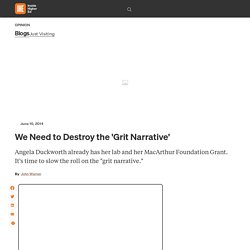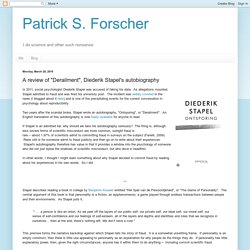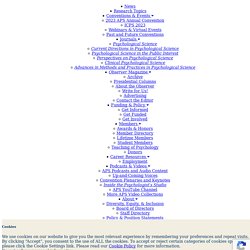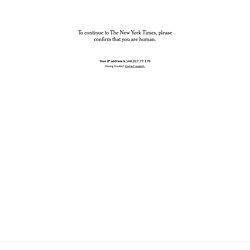

Evaluating Coca-Cola’s attempts to influence public health ‘in their own words’: analysis of Coca-Cola emails with public health academics leading the Global Energy Balance Network. Untitled. If John Carlisle had a cat flap, scientific fraudsters might rest easier at night.

Carlisle routinely rises at 4.30 A.M. to let out Wizard, the family pet. Then, unable to sleep, he reaches for his laptop and starts typing up data from published papers on clinical trials. Before his wife’s alarm clock sounds 90 minutes later, he has usually managed to fill a spreadsheet with the ages, weights and heights of hundreds of people—some of whom, he suspects, never actually existed. By day, Carlisle is an anesthetist working for England’s National Health Service in the seaside town of Torquay.
(99+) (PDF) Gaming the Metrics: Misconduct and Manipulation in Academic Research. We Need to Destroy the 'Grit Narrative' I woke up this morning at 5:30am and started thinking about “grit.”

I was probably even thinking about “grit” in my sleep. I was thinking about “grit” because I’m not quite done gnawing on the conversational bone started by my previous post on the subject. I’d figured some things out for myself, but I clearly had more to sort through. One of the things I was thinking about was whether or not in that moment of thinking about “grit,” if I was indeed being, “gritty,” and if I was being “gritty,” what was causing me to be this way? Had I developed grit overnight? Angela Duckworth defines “grit” as “the tendency to sustain perseverance and passion for challenging long-term goals.” That said, I was being nothing if not persistent. Why? (99+) (PDF) Misinformation and Its Correction Continued Influence and Successful Debiasing. Patrick S. Forscher: A review of "Derailment", Diederik Stapel's autobiography. In 2011, social psychologist Diederik Stapel was accused of faking his data.

As allegations mounted, Stapel admitted to fraud and was fired his university post. The incident was widelycovered in the news (I blogged about it here) and is one of the precipitating events for the current conversation in psychology about reproducibility. Two years after the scandal broke, Stapel wrote an autobiography, "Ontsporing", or "Derailment". An English translation of this autobiography is now freely available for anyone to read.
John Ioannidis has dedicated his life to quantifying how science is broken. Derailed: The Rise and Fall of Diederik Stapel. Diederik Stapel fabricated data for over 50 peer-reviewed articles, many of which were published in leading journals, including Science.

He has now published Ontsporing (Derailed), a 315-page autobiography that provides a fascinating tale of the events leading up to and following the discovery of his large-scale academic fraud. [1] The book’s opening chapter depicts a sweating, indicted Stapel driving through The Netherlands, retracing the locations in which his fraudulent studies were presumably carried out, anxiously trying to straighten out his story and evade the inevitable. The scene is gripping. In the pages to follow, Stapel gives a first-person account of one of the biggest fraud cases in scientific history. If only for that reason, the book is priceless and revealing. Although the details of how Stapel was caught have been widely publicized, Ontsporing provides the first glimpses of how, why, and where Stapel began. Nobody ever checked my work. Diederik Stapel’s Audacious Academic Fraud - NYTimes.com. Diederik Stapel – eminent “pop star” psychologist and blatant fraudster The British amateur who debunked the mathematics of happiness.
Nick Brown does not look like your average student.

He's 53 for a start and at 6ft 4in with a bushy moustache and an expression that jackknifes between sceptical and alarmed, he is reminiscent of a mid-period John Cleese. He can even sound a bit like the great comedian when he embarks on an extended sardonic riff, which he is prone to do if the subject rouses his intellectual suspicion. A couple of years ago that suspicion began to grow while he sat in a lecture at the University of East London, where he was taking a postgraduate course in applied positive psychology. There was a slide showing a butterfly graph – the branch of mathematical modelling most often associated with chaos theory.
On the graph was a tipping point that claimed to identify the precise emotional co-ordinates that divide those people who "flourish" from those who "languish". According to the graph, it all came down to a specific ratio of positive emotions to negative emotions. It was as simple as that. Noted Dutch Psychologist, Stapel, Accused of Research Fraud.
A well-known psychologist in the Netherlands whose work has been published widely in professional journals falsified data and made up entire experiments, an investigating committee has found.

Experts say the case exposes deep flaws in the way science is done in a field, , that has only recently earned a fragile respectability. The psychologist, Diederik Stapel, of Tilburg University, committed academic fraud in “several dozen” published papers, many accepted in respected journals and reported in the news media, according to a report released on Monday by the three Dutch institutions where he has worked: the University of Groningen, the University of Amsterdam, and Tilburg. The journal Science, which published one of Dr. James Randi: Scientists Fooled by a Match Box Trick.